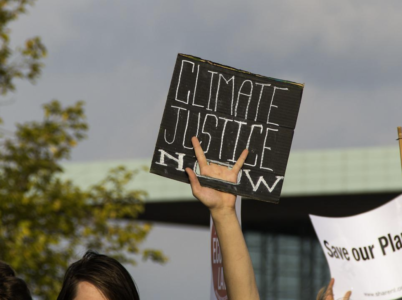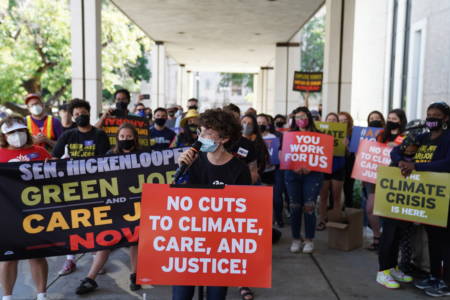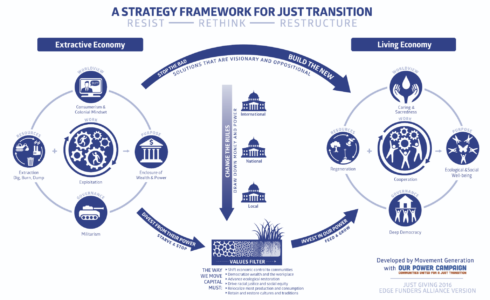What Is Climate Justice?
 Climate justice is a particular type of environmental activism that addresses the social and ethical dimensions of climate change, not just the physical effects of our warming planet. Climate justice means thinking about climate change as a social issue, and acknowledging that vulnerable communities will bear the greatest costs of climate change –- low-income communities, people of color, indigenous people, and older or young people. These impacts include wildfires, air pollution, access to water, rising sea levels, and more.
Climate justice is a particular type of environmental activism that addresses the social and ethical dimensions of climate change, not just the physical effects of our warming planet. Climate justice means thinking about climate change as a social issue, and acknowledging that vulnerable communities will bear the greatest costs of climate change –- low-income communities, people of color, indigenous people, and older or young people. These impacts include wildfires, air pollution, access to water, rising sea levels, and more.
Our goal is not simply to shift to renewable energy, it’s to build a just and equitable society. And you can’t do that without the expertise of those most affected by the climate crisis. That’s why climate justice centers frontline communities and works through grassroots organizing to build power among the people (instead of corporations) so that we can build a world that works for everyone, not just a few!
Learn more about the principles of climate justice.
What is A Just Transition?

DENVER, COLORADO – at Byron Rogers Federal Building on August 19, 2021 in Denver, Colorado. (Photo by Leigh Vogel/Getty Images for Green New Deal Network)
You may have seen on our homepage that one of our pillars of action is “Promote Just & Equitable Solutions.” But what does that mean in action?
Let’s take one of our campaigns as an example. 350 Colorado is working to shut down the Suncor Refinery in North Denver. The 80216 zip code, home to the neighborhoods of Globeville and Elyria-Swansea, is one of the most polluted zip codes in the country. This is in large part due to the Suncor Refinery, which processes 98,000 barrels of crude oil sands per day.
This densely-populated, working-class neighborhood is 80 percent people of color, while Denver itself is 80 percent white. Poor air quality has led to health issues in the community, including cancer and asthma, and everyone deserves to breathe clean air –- regardless of the color of your skin or the neighborhood that you live in.
In order to improve the air quality for our community, to reduce emissions in Colorado, and to fight climate change, Suncor needs to be shut down. Here’s how you can join us in making this happen.
However, Suncor also employs more than 400 people, and part of a just transition is a just transition for working people whose lives depend on the income that currently comes from the fossil fuel industry.
- A just transition means holding big polluters like Suncor accountable for their actions while minimizing challenges faced by communities impacted by moving towards a green, sustainable economy.
- A just transition means creating good jobs in green energy and leaving no one behind.
- A just transition means reparations for those who have suffered from the climate crisis.
- A just transition means holding those responsible for the climate crisis accountable (100 companies are responsible for 70 percent of the world’s greenhouse gas emissions since 1988) while empowering frontline communities.
- A just transition means active dialogue between everyone impacted and that benefits are distributed fairly.

Design: Micah Bazant
In the case of the Suncor Refinery, a just transition could mean that elected officials sit down with elected representatives of workers’ organizations as well as refinery management and find solutions to shift towards renewable energy. Those solutions would be determined by community members and may include things like paid training, career development, or relocation to take on a different job.
The Suncor Refinery is just one example of many in communities across our state where we must not only fight for green, renewable energy and an end to fossil fuels, but also a just transition from extractive industries.
A just transition looks different in every community. From fracking in Weld County to coal plants in Colorado Springs, fossil fuel investments in public employee retirement funds, and sustainable agriculture on the eastern plains and western slopes, our climate movement must center frontline communities.
In our communities, there is a wealth of knowledge and ideas for solutions to this crisis! Our goal is to build power and put those solutions into action.
What Does Justice, Equity, Diversity, and Inclusion Mean To 350 Colorado?
We are committed to identifying and addressing inequality in the climate movement, including inequality within our own organization. Our goal is to ensure that those most impacted always have a seat at the table and that we maintain supportive and non-extractive relationships with impacted communities. Our grassroots movement is inclusive and welcoming to all.
If, and when, we slip in our commitment to justice, equity, diversity, and inclusion, we promise to engage in restorative justice with those harmed and continue to address these issues on a systematic scale within our organization.
Our work to address justice, diversity, equity, and inclusion formally started in 2017, but just like our work as climate activists, there is always more work to be done. If you have felt unwelcome or discriminated against in any 350 Colorado space and are willing to engage in dialogue with us on how we can improve, please get in touch!
Learn More: Read about Principles of Climate Justice
Resources
- 21-Day Equity Challenge to inspire reflection and action in service of justice. Try completing the course on your own or with your community!
- Check out organizations like Climate Justice Alliance and Indigenous Environmental Network for more information on climate justice.
- Want to learn more about microaggressions? Check out this article
- Read about how you can interrupt bias here.
